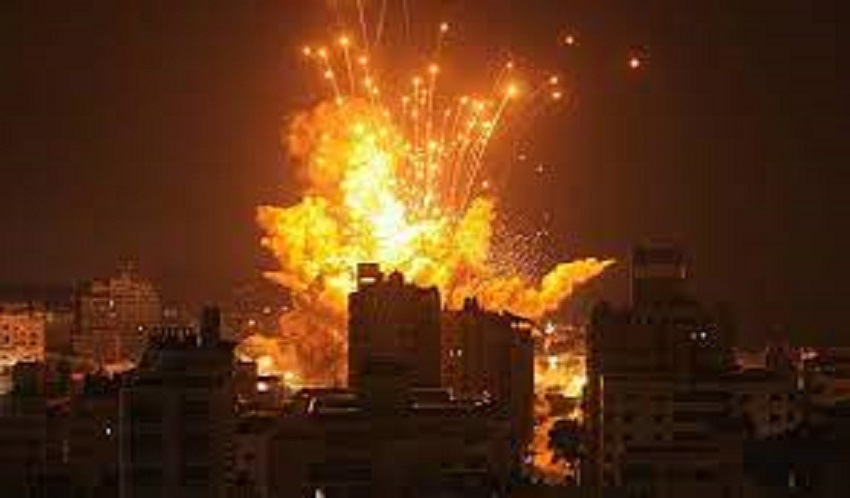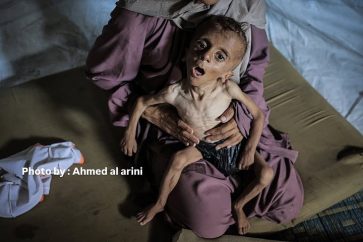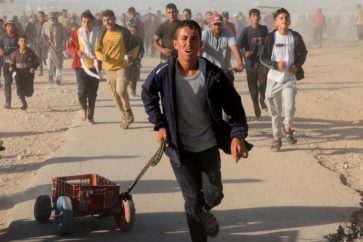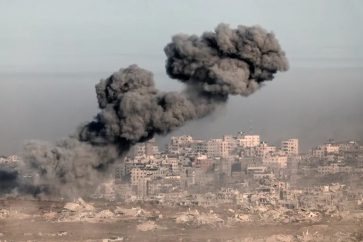The Israeli aggression against the Gaza Strip has entered its 62nd day, leaving a trail of destruction, martyrs, and wounded civilians. The relentless bombings, shelling, and raids by Israeli forces show no signs of abating, as innocent lives continue to be lost.
The latest round of attacks resulted in at least 17 citizens losing their lives and dozens more sustaining injuries. The Maghazi camp in the central Gaza Strip bore the brunt of the assault, with an Israeli warplane targeting a house belonging to the Al-Mashi family. The bombarding of this house, which was sheltering displaced families, caused significant damage to a neighboring house as well.
Further south, in the Shaboura camp in Rafah, at least 6 citizens were martyred and others injured when an Israeli aircraft bombed a house in the area. The occupation forces also launched attacks on the homes of several families, including the Asfoura, Al-Najjar, Abu Al-Asal, and Aweidah families, as well as the Abu Hussein School in Jabalia. These ruthless assaults added to the mounting death toll and resulted in many more wounded.
Israeli jets bombarded a residential home in Al Shabora refugee camp in Rafah city, southern #Gaza. pic.twitter.com/gg67PqSMkp
— PALESTINE ONLINE 🇵🇸 (@OnlinePalEng) December 6, 2023
Jabalia camp, in particular, faced a devastating blow when Israeli aircraft unleashed internationally banned phosphorus bombs, causing further casualties and igniting fires. With the ongoing Israeli bombing and siege, residents of Jabalia camp were forced to bury dozens of martyrs in a mass grave within the camp’s premises. The sheer intensity of the attacks made it difficult for ambulances and rescue crews to reach the affected areas, leaving many wounded victims trapped under the rubble without access to medical aid.
The Khan Yunis Governorate in the southern Gaza Strip also witnessed continuous airstrikes on homes and coastal areas by Israeli warboats. The occupation aircraft targeted agricultural land and a house belonging to the Sadiq family on Jalal Street, causing chaos and more casualties. The Nasser Hospital in Khan Yunis received numerous martyrs and wounded from the bombings in the central areas of the city.
Meanwhile, in Deir al-Balah, the airstrikes persisted, with a house on Al-Baraka Street being bombed. Nuseirat also faced a series of attacks, while the Al-Sharif family’s house on Jaffa Street in Gaza City suffered a similar fate. Additionally, the occupation forces fired a barrage of poison gas bombs in the eastern part of the Sheikh Radwan neighborhood in Gaza, resulting in significant injuries among citizens.
Rescue teams, civil defense personnel, and locals persist in the search for victims following a severe Israeli bombardment on residences in Deir Al-Balah in the central #Gaza Strip. pic.twitter.com/xQNv0FfdCr
— PALESTINE ONLINE 🇵🇸 (@OnlinePalEng) December 6, 2023
Compounding the situation, hospitals in the northern Gaza Strip were overwhelmed and unable to cope with the influx of casualties. The relentless Israeli raids, combined with limited resources and blocked transportation routes, further complicated the mission of rescuers and healthcare providers. Tragically, some injured individuals did not receive the timely medical attention they needed, leading to avoidable deaths.
As the areas of central and northern Gaza wail under the bombardment, civilians continue to pay the highest price. The enemy Israeli army’s intensified aggression against residential areas triggers more casualties with each passing day. At least 18 martyrs and several injured victims have been reported in the recent attacks, including the tragic loss of the father, mother, and siblings of journalist Moamen Al-Sharafi.
Israeli warplanes bombarded the residential home of Misbah family in Deir Al Balah, central Gaza. https://t.co/HwbLXNHKdH pic.twitter.com/QIDAEI3hxo
— PALESTINE ONLINE 🇵🇸 (@OnlinePalEng) December 6, 2023
However, amidst the despair, there were hints of a potential respite. Under pressure from the United States, the Israeli occupation government approved the increase of fuel shipments to the Gaza Strip. The decision to double the amount, from 60,000 liters to 120,000 liters, was met with mixed reactions within the Israeli Council. While some members supported the move, Finance Minister Smotrich and Ben Gvir opposed it.
Source: Al-Manar Website




